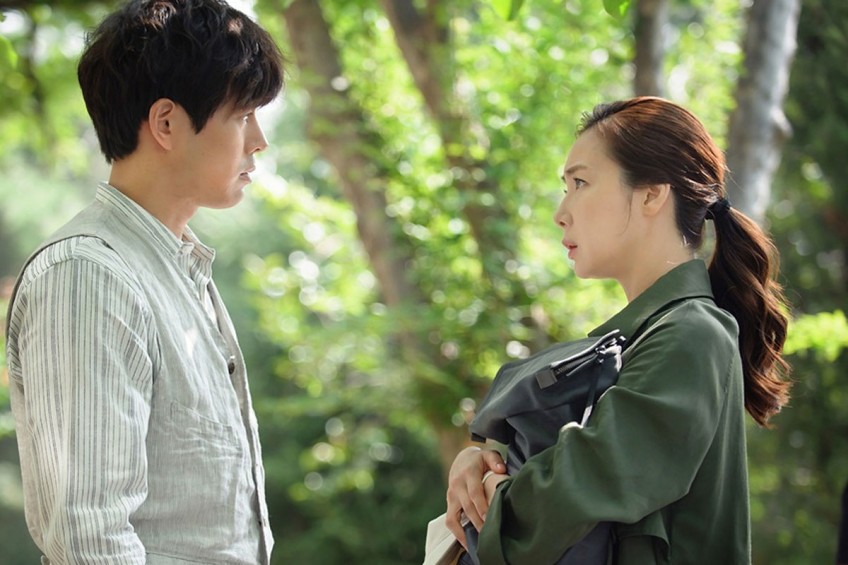First love, second chance

A housewife (Choi Ji Woo), given what will be revealed to be an incorrect diagnosis of pancreatic cancer, sobs her heart out at a bus stop.
On the soundtrack in the K-drama Second Twenties, a gentle guitar refrains from weeping along with her, however. And there is no pity party waiting for her at home, where her hints about her apparently impending death fall on unsympathetic ears.
"Everyone dies once," her husband, a psychology professor who is preparing to divorce her, intones. If she is dying, she should just spend more time on herself, he advises. "How many times do I have to say it? Humans are a fundamentally lonely species."
The music swells, when Choi then secretly enrols as a humanities student at a university, years after dropping out of high school because of unplanned motherhood and marriage. By the time she is planning routes to take around the campus to avoid bumping into and embarrassing her only son, a fellow first-year student, the soundtrack is positively festive.
Like Oh My Ghost, which preceded Second Twenties as a hit on South Korea's leading cable channel tvN, this latest show is life-affirming because it's also death-affirming. Because death is a scythe that cuts through the maze of life and brings clarity.
Before the diagnosis, Choi was something of a doormat. She wanted to go back to school for her husband, wishfully thinking he would stay in the marriage if she could hold a conversation about philosophy.
After the diagnosis, details of her past trickle back to her. She was a dance student and she had dreams. And now - just for herself and regardless of what the b-boys on campus think - she wants to join a dance club.
Second Twenties is the work of So Hyun Kyung, who also wrote Brilliant Legacy (2009), 49 Days (2011) and Seo Yeong, My Daughter (2012), a show that has to be seen to be believed. For much of 50 remarkable episodes, that drama follows a lie Seo Yeong tells in a moment of exasperation and all the ripples it causes across three families. And in the background, there is an examination of how parents' unlived lives cast shadows on their children.
In Second Twenties, which is a lighter and looser dramedy, Choi's unlived life is thrown into relief by the spectre of cancer, which she soon sees as a blessing in disguise.
Back in school, she also meets could-have-been and should-have-been versions of herself. There is Choi's tutor in a marriage and gender roles course, a bachelorette who has put off her love life for years. Now she is sneaking around with her boyfriend (Choi's husband) and waiting for him to be available for marriage again.
There is Choi's classmate, a millennial who doesn't want to be anyone's token, obedient girlfriend. Her boyfriend (Choi's son) expects her life to revolve around his timetable, but she pushes him into partying with her.
Then there is Choi's theatre professor (Lee Sang Yun), a former drama geek made good. She was Lee's first love in high school and he may still be sweet on her. (Lee is huffy, prickly and tender and might be a little too much like the husband he played in Seo Yeong, My Daughter, perhaps.)
Six episodes in, Second Twenties is pointing in the direction of a romcom about regrets and second chances. Like Choi, the show still has possibilities, however, and might yet surprise you.
You and I, urbanites who are up to our ears in gastro-porn - we are sick, according to the diagnosis of the tvN drama Let's Eat 2. Our endless hunger is actually loneliness, our failure to connect with others despite being permanently plugged into our social media accounts. The show's cure is to fight poison with poison, to treat us to feast after feast at which a food blogger (Yoon Du Jun) and his friends bite, lick, suck and moan in ecstasy over Korean, Chinese, Indian and Mexican cuisine.
The story, almost an afterthought, is about Yoon's reunion with a classmate, a fellow gourmet who has somehow set her heart on marrying a civil servant who takes little pleasure in food.
I don't mean to give too much away, but there may be a crumb of wisdom in the drama's insight that appetites should be compatible in relationships. Maybe you are not just what you eat, but also how you eat.

This article was first published on September 16, 2015.
Get a copy of The Straits Times or go to straitstimes.com for more stories.